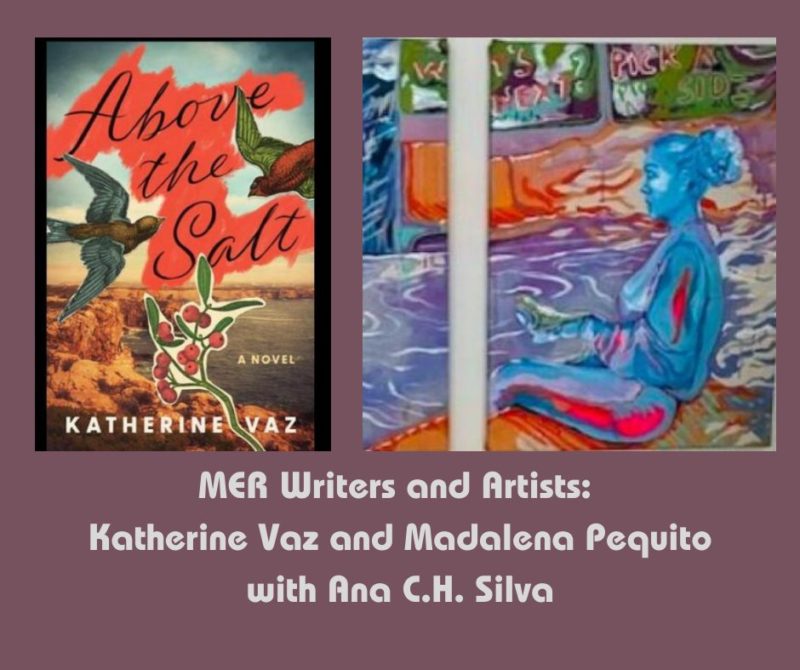
Portuguese- American Writer Katherine Vaz, and Portuguese Artist Madalena Pequito In Conversation With Ana C.H. Silva
This June I attended the Disquiet International Literary Program in Lisbon, Portugal. It was the first time I’ve ever been part of a larger Luso/as (Portuguese) gathering beyond family dinners – perhaps if you don’t count that Maritza concert I attended at Carnegie Hall! Our families hailed from the Azores, Portugal, Brazil, and Cape Verde, so we were a diverse group, but we could see especially from our writings that certain strands rooted in language and familial culture connected us. Sitting with equal parts grace and force at the helm of our “Writing the Luso/a Experience” workshop was Katherine Vaz, an acclaimed short story writer and novelist who is the first Portuguese-American to have her work recorded for the Archives of the Library of Congress. Vaz introduced us all to Madalena Pequito, a Portuguese artist based in Lisbon, and after Madalena’s brief presentation, we greedily jumped online to search for even more of her color-drenched images. Here, we talk about mothers, women, and what “motherhood” means. Be sure also to catch our MER Writers and Artists youtube conversation where Katherine reads from her new novel, Above the Salt, and where you can see examples of Madalena’s work. — Ana C.H. Silva
Katherine, you mentioned at one point wanting a chance to speak of your mother.
My mother, Elizabeth Sullivan Vaz, who died at the age of 95 on November 19th, 2022, in her home—the place I grew up, in Castro Valley, California–was bright and witty to the end, reading books in her final month while dying of kidney failure. In high school, she placed in a national Scholastic Magazine contest by writing a short story; I think she got Honorable Mention, a piece about a mother anxious to get a letter from her son at war. In the end, it’s revealed that she’s German. I have this, written out in ink in her hand. Her love of books deeply influenced me, as did her attitudes toward life: Every day is a chance for something new. I miss her. My novel Above the Salt is the first book I’ve written when I did not receive a long loving letter from her.
What does “motherhood” mean to you?
Speaking as a childless woman who is sixty-eight: I have seven nieces and nephews, all of whom are dear to me…To me as someone without children—I fear I am still of that generation that was persuaded that women had to choose motherhood or career—I fully support feminist agendas to help women with children, because I have great compassion for how difficult it must be to balance home care, maternity, work. Women still have to do most of it. In my case, dare I say that I have felt almost maternal toward the many Luso/a students I’ve had in over a decade of my Writing the Luso Experience workshop in the Disquiet International Literary Program each summer in Lisbon, fostering a new generation of authors with our common or shared roots. I directly take my mother’s philosophy of encouraging people to find who they are and live that life.
Madalena, you told me, “I let my everyday life influence my paintings. My central object of study is contemporary society.” You convey those beliefs in the value of women’s lives and your confidence in women’s fundamental strength through the female figures of your paintings – though they are surrounded by dynamic, troubling, complex contexts, they still convey a groundedness, and offer me, as a viewer, a feeling of serenity.
Madalena, what questions are you pursuing in your work related to women?
My work explores what happens in the (my) world. It explores many moments in my life, challenges I face and also things that happen today and that I witness. I use my work to express what worries me, as an unburden, as a way to expose some things that have happened in my life. However, I also use my work to investigate and to speak about other issues that may not have happened to me directly but that I can’t be indifferent to. An example is the work “I haven’t given up yet”. In this work I speak about the memory of my grandparents, about their life story and about my childhood memories and my big family that keeps on having more babies and creating new generations. In parallel, this work explores and wonders why women’s rights are constantly challenged. This work was created when Roe vs Wade was overturned and women’s rights in the US were challenged again. In this same year, the war in Ukraine had just started and I was wondering how to bring more children in a world that is in destruction. Today, it makes even more sense (conflicts in Palestine, Sudan, Congo, women being forbidden to study in Afghanistan, etc), because children and women are always the first ones to see their rights being taken away. I feel lucky and privileged because I can use my voice, but I feel that it is not fair that I am speaking about something that I have never been through. I have many other works that are more figurative in which I speak a more personal perspective of my challenges and a young woman artist, my questions, self-doubting, fights. Despite all this, my work is hopeful. I draw plants, because I believe in the future or at least I want to.
What does “motherhood” mean to you?
I am not a mother, yet. I have that desire. As I expressed in the first question, that is something I would like to do, despite the dystopian world we live in. For me, it is caring for someone, wishing them all the best. It is a bond you can’t really describe – like when you don’t have to talk and the other person already knows what you are thinking.
MER Writers and Artists: Mom Egg Review hosts a conversation between Portuguese-American writer Katherine Vaz, and Portuguese artist Madalena Pequito. Katherine reads from her new novel, Above the Salt and explores how family stories intersect with her fiction. We see and discuss a subset of Madalena’s work that highlights a central female figure, and we discuss how our own sense of doubt fuels art that can be, ultimately, a tonic for a troubled world. Click to watch the video on our MER YouTube channel.
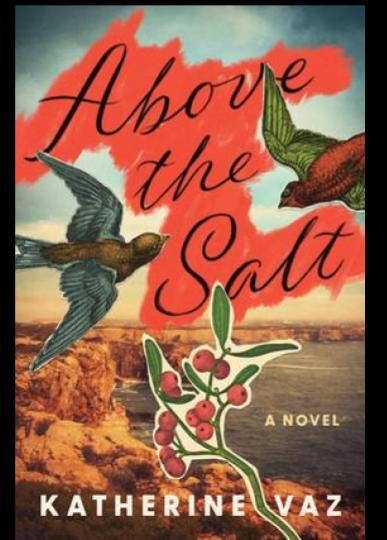
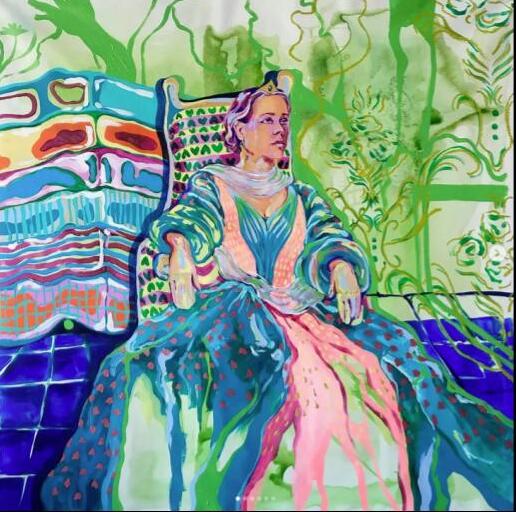
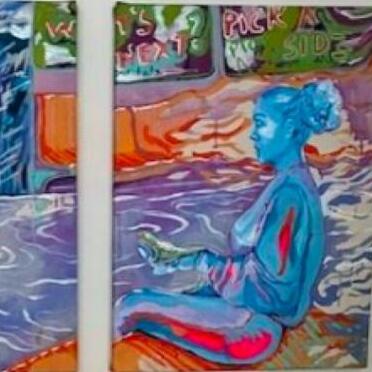
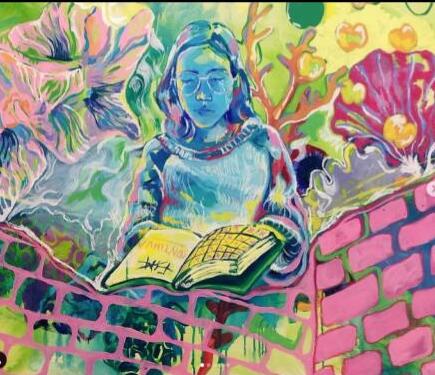
Author of ABOVE THE SALT, MARIANA, FADO & OTHER STORIES, OUR LADY OF THE ARTICHOKES, and SAUDADE, former Briggs-Copeland Fellow in Fiction at Harvard and Fellow of the Radcliffe Institute, Katherine Vaz is the first Portuguese American with work recorded for the Archives of the Library of Congress, Hispanic Division. Born in Lisbon, in 1996. Lives and works in Lisbon. Madalena Pequito studied at Escola António Arroio, graduated in Painting at FBAUL, and completed a master ‘s degree at Central Saint Martins. In 2023, she received an award from FLAD, which financed her residencies in New York: Kunstraum Llc and Mothership. She participated participated in several national and international biennials and art prizes. Madalena has participated in over 50 exhibitions (group and solo) nationally and internationally. Ana C. H. Silva, an Editor-at-Large (Gallery) for MER, (she/her) lives in NYC and Olive, NY. Her poetry chapbooks are While Mercury Fish with Finishing Line Press and One Cupped Hand Above the Other with Dancing Girl Press. |

